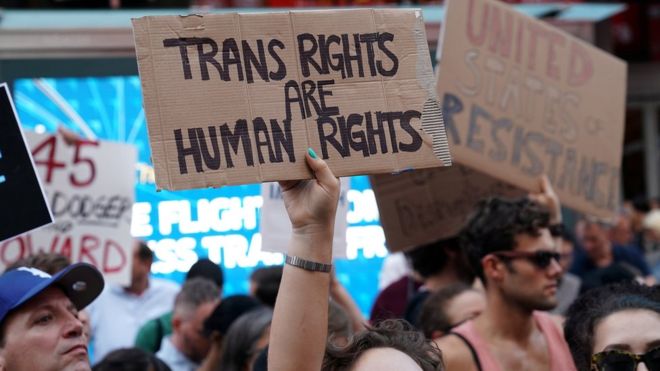Trump’s Discriminatory Policy
Protesters against Trump’s transgender military ban.
April 15, 2019
After being approved by the Pentagon back in March, on Friday, April 12th, Trump’s discriminatory transgender military policy, which prevents openly transgender people from joining the military, went into effect. It is truly off putting that someone who loves their country enough that they are willing to risk their life to protect it, will be denied entry into the military just because they do not identify with their biological sex.
Although this policy does not directly affect me, as a minority, it begs the question what other discriminatory actions this administration might take in the future. The ban has often been rightfully compared by many people to the “Don’t Ask, Don’t Tell” policy, which banned openly gay individuals from serving in the military.
This poorly made decision, while highly disappointing, is not all that surprising considering Trump has been advocating for it since 2017.
An argument that many supporters of the policy falsely support, is how much money the medical expenses of transgender people will cost the military. The president has previously stated that “Our military must be focused on decisive and overwhelming victory and cannot be burdened with the tremendous medical costs and disruption that transgenders in the military will entail.”
However, according to a study done by the RAND corporation that was commissioned by Defense Secretary Ashton B. Carter, it concluded that allowing transgender people to openly serve in the military would not be costly or affect the unit’s performance: “Paying for the procedures would cost the Pentagon between $2.9 million to $4.2 million a year, the report said. By comparison, the Pentagon each year spends $6 billion of its $610 billion budget on medical costs for active-duty service members.”
Many supporters of this policy also fail to realize that being transgender does not affect how well someone is able to perform in the military.
The same study pointed out that although a Pentagon report incorrectly stated that transgender people are not medically fit enough to be active in the military, the Pentagon’s data proved that they in fact are. This is also backed up by 6 former Surgeons General, who signed a statement that disagreed with the Defense Department’s claim that transgenders are not medically fit.
The statement was in response to the news of the transgender military ban and said that there was no medically valid reason to ban transgenders from the military. “We underscore that transgender troops are as medically fit as their non-transgender peers and that there is no medically valid reason—including a diagnosis of gender dysphoria—to exclude them from military service or to limit their access to medically necessary care.”
The Pentagon has also stated that technically, the policy does not ban transgender individuals from serving in the military and that they can just pretend they are not transgender. However, I firmly believe that this is an excuse for their discriminatory policy. Joshua Block, a senior staff lawyer at the American Civil Liberties Union, said “What the White House has released tonight is trans-phobia masquerading as policy.”
With evidence that refutes the claims that many advocates of this policy support, it is evident that the policy against transgender people in the military has nothing to do with the overall fitness of the military or not being able to afford medical expenses; it is simply about the transphobic mindsets that plague many people in power.

